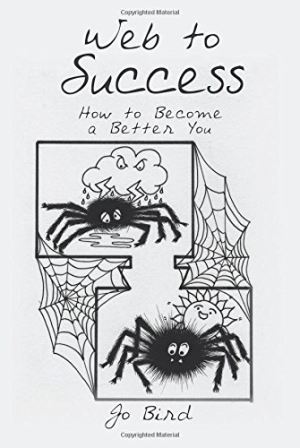Web to Success
How to Become a Better You
Web to Success presents a broad overview of basic self-improvement concepts in a single volume.
Jo Bird’s Web to Success offers a serviceable summary of the most common success factors.
In her introduction, Bird says she realized that “the mountain of information on positive thinking and personal development I’ve collected over the years is all interlinked.” This volume is the author’s attempt to create a “web,” or meld together key ideas from various sources, and organize them into three major self-improvement areas: self-awareness, emotional awareness, and personal development.
The book is composed of a trio of lengthy chapters, one devoted to each area, which start with a quote and end with a summary. The chapters are further divided into topics. “Personal Development,” for example, covers work-life balance, time management, self-confidence, focus and concentration, communication, success, and emotional intelligence.
Each of the smaller sections also starts with a quote, followed by a general discussion of the topic. The organizational structure is a major strength of the book: The three main subject areas immediately indicate what the book is about, and the sub-sections make it very easy to identify and isolate portions of the content that may be of particular interest. The summaries of each major area reprise the content and act as useful bridges to subsequent sections.
Most of the text has a ring of familiarity to it, probably because many other self-improvement books tread similar ground. Sentences like “Understanding our own emotions, and those of others requires an understanding of our strengths, weaknesses, and, perhaps most importantly, our limits” and “Before we can love another person we have to love ourselves” may be adequate, but they are overused.
In addition, the static, somewhat juvenile illustrations of spiders acting out phrases (such as a spider drinking from a straw in a glass, accompanied by the phrase “glass half full”) might relate to the “web” in the book’s title, but they do little to enhance the appearance of the pages.
Yet, there are helpful bits of advice peppered throughout each section; “Self-awareness,” for example, lists three useful steps to self-awareness and ten “advanced self-awareness techniques.” In addition, the author’s writing style is personal and approachable, and she shares her own experiences and perspectives candidly and with good humor. The quotes that begin each topic area are also well chosen.
Web to Success presents a broad overview of basic self-improvement concepts in a single volume.
Reviewed by
Barry Silverstein
Disclosure: This article is not an endorsement, but a review. The publisher of this book provided free copies of the book and paid a small fee to have their book reviewed by a professional reviewer. Foreword Reviews and Clarion Reviews make no guarantee that the publisher will receive a positive review. Foreword Magazine, Inc. is disclosing this in accordance with the Federal Trade Commission’s 16 CFR, Part 255.

